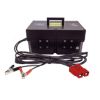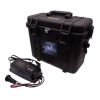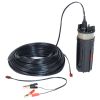Proactive Abyss 300 Plastic Pump
Features
- Sample down to 40mL per minute with controller
- Pump can run continuously in water without the need for a cool down
- 3000 hour motor life provides a very economical sampling solution
- Free ground shipping
- Expedited repair and warranty service
- Lifetime technical support
- More
Overview
The Engineered Proactive Plastic Abyss 300 pump is capable of pumping up to 300 feet depth to water (DTW) by simply connecting it to a 12V battery using the Low Flow with Power Booster 4 Controller.
Applications
Its reliable design and low amp consumption make it the ideal pump for groundwater sampling and remediation pump and treat systems. The Abyss 300 pump can run continuously, 24 hours a day, 7 days a week, for remote situations when the pump needs to run when no technician is present. The Engineered Plastic Abyss 300 can even be used for low-flow sampling (Fractional Flow).
- Power Consumption: 75 Watts (max)
- Volt Recommendation: 12-15V at source
- Maximum Amp Output: 5 Amps
- Measurements: 12" length x 3.83" diameter
- Use With: Low Flow with Power Booster 4 Controller
- Required Tubing: 3/8" or 1/2" ID tubing
- Supplied With: 310 Feet of Heavy Duty 12 Gauge Wire & Red Connector
- Seal and Valve Construction: Viton
In The News
Three Decades of Research at Acton Lake
A multi-disciplinary team at Miami University, Ohio, has been studying the environmental change at Acton Lake for over three decades. Using three different NexSens buoys over this time, the team has an incredible archive of data that is helping build a picture of Acton’s past, present, and future. Until recently, a NexSens CB-50 buoy was used alongside other environmental monitoring at Acton Lake. In May 2025, the Miami team deployed a new XB-200 buoy , future-proofing their ongoing monitoring using real-time buoy systems. Acton Lake, a small hypereutrophic reservoir in southwest Ohio, covers 2.4km² and has a maximum depth of about 8m. The dam was built in 1956, and the lake has a large agricultural watershed.
Read MoreSource Water Monitoring in Albany, New York: Tracing Water Quality throughout Tributaries
Thousands of US cities pull their drinking water from natural source waters like reservoirs, rivers, and streams, making overall watershed health a key consideration for water providers. In Albany, New York, the Albany Department of Water and Water Supply delivers drinking water to over 100,000 residents as well as monitors and manages the larger drinking water supply watershed. Hannah Doherty, Environmental Specialist at the Albany Department of Water and Water Supply , spends her days working with a small team to monitor the drinking supply and the connected water bodies. Doherty explains, “We’re the first to encounter the water that ends up being the drinking water.
Read MoreWildfire Prevention in the Sierra Nevada Region with the Yuba Watershed Institute
Though recent wildfires have sparked new conversations about wildfire management and response, groups like the Yuba Watershed Institute have been monitoring the forests and water resources of the Sierra Nevada region for decades, managing approximately 5,000 acres of land with the Bureau of Land Management (BLM) and about 7,000 acres in private land partnerships. The goal of the Institute is to work with local communities and land agencies to improve watershed and forestry management through informed practices and public outreach. The goals of the Yuba Watershed Institute are three-fold: Improve the ability of fire suppression agencies like the California Department of Forestry and Fire Protection ( CAL FIRE ) and the US Forest Service.
Read More














